状语从句(含练习与答案)
语法专题:状语从句(含练习和答案)
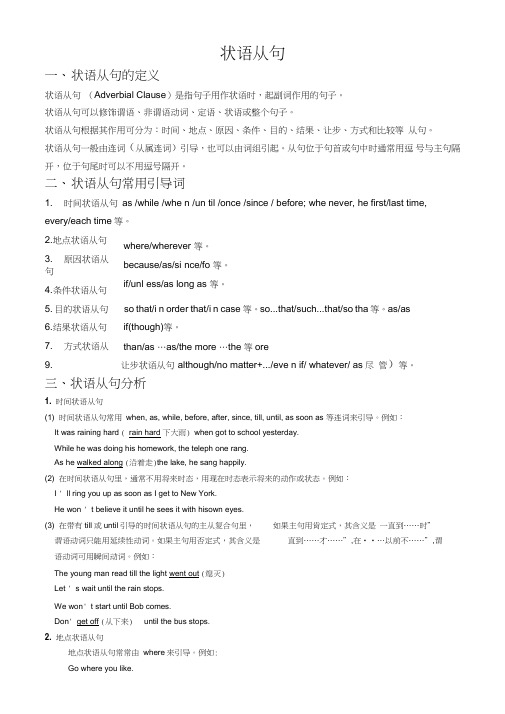
状语从句一、状语从句的定义状语从句(Adverbial Clause)是指句子用作状语时,起副词作用的句子。
状语从句可以修饰谓语、非谓语动词、定语、状语或整个句子。
状语从句根据其作用可分为:时间、地点、原因、条件、目的、结果、让步、方式和比较等从句。
状语从句一般由连词(从属连词)引导,也可以由词组引起。
从句位于句首或句中时通常用逗号与主句隔开,位于句尾时可以不用逗号隔开。
二、状语从句常用引导词1. 时间状语从句as /while /whe n /un til /once /since / before; whe never, he first/last time,every/each time等。
2. 地点状语从句3. 原因状语从句4. 条件状语从句5. 目的状语从句6. 结果状语从句7. 方式状语从句where/wherever 等。
because/as/si nce/fo 等。
if/unl ess/as long as 等。
so that/i n order that/i n case等。
so...that/such...that/so tha等。
as/as if(though)等。
than/as …as/the more …the 等ore9. 让步状语从句although/no matter+.../eve n if/ whatever/ as尽管)等。
三、状语从句分析1. 时间状语从句(1) 时间状语从句常用when, as, while, before, after, since, till, until, as soon as 等连词来引导。
例如:It was raining hard ( rain hard 下大雨) when got to school yesterday.While he was doing his homework, the teleph one rang.As he walked along (沿着走)the lake, he sang happily.(2) 在时间状语从句里,通常不用将来时态,用现在时态表示将来的动作或状态。
(英语)英语状语从句练习题含答案含解析
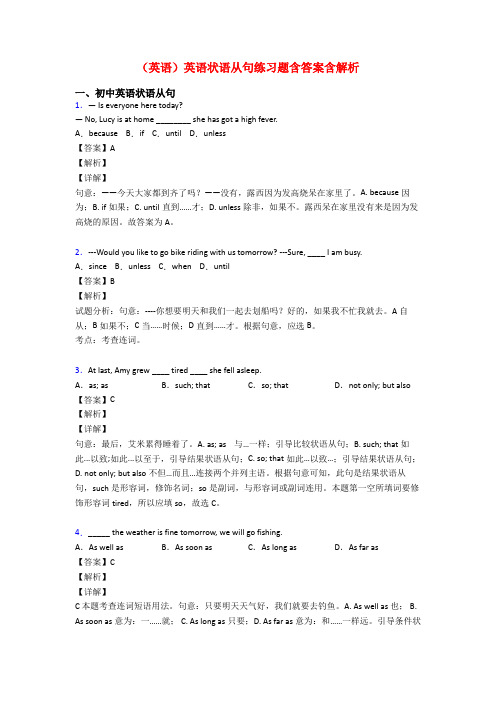
8.— What’s the weather like this weekend?
— It will bebad weather that we can’t go on the picnic.
A.such aB.suchC.so aD.so
【答案】B
【解析】
句意:——这个周末天气怎么样?——天气太糟了,我们不能去野餐了。因为weather为不可数名词,因此不用冠词。A/C不对。再因为中心词为名词,用such而不用so。故选B。
如:He became so angry that he couldn’t speak.
他变得很生气,以致说不出话来。
9.– I usually choose to take the train to travel __________ I'm free.
-So do I. I think we can enjoy something beautiful on the train
(英语)英语状语从句练习题含答案含解析
一、初中英语状语从句
1.— Is everyone here today?
— No, Lucy is at home ________ she has got a high fever.
A.because B.if C.until D.unless
【答案】A
【解析】
16.I’m going to take him to some famoushutongs_____ he can learn more about China.
A.becauseB.whenC.so thatD.as if
【答案】C
【解析】
试题分析:句意:我带他去一些有名的胡同,为了让他更多的了解中国。A因为;B当……时候;C为了;D似乎;故选C。
状语从句知识点总结及经典习题(含答案)

一I will telephone the police and complain about itthe noise stops soon.
A.unlessB.thoughC.becauseD.if
【答案】A
【解析】
【详解】
句意:----那么你会怎么做?-----我会给警察打电话投诉,除非噪音很快停止。考查连词辨析。A. unless除非,如果不,引导否定的条件状语从句;B. though虽然,尽管,引导让步状语从句;C. because因为,引导原因状语从句;D. if如果,引导条件状语从句。根据句意可知后句表示否定条件,填unless;选A。
【答案】A
【解析】
【详解】
句意:怀特先生告诉我们,如果明天没有达成协议,电话会议将取消。本题是含有if引导的条件状语从句的复合句。在if引导的条件状语从句中,如果从句谈论的是一个有可能发生的事实及其产生的相关的结果,主句用一般将来时态,从句用一般现在时态。选项的位置在if引导的条件状语从句中,要用一般现在时态,B C选项是将来时态不符合题意要排除。D选项是现在完成时态不符合题意要排除。Reach an agreement达成协议固定短语搭配。agreement is reached协议做主语要用被动语态,故选A。
5.—Winter swimming is exciting, but one can’t do it ________ he or she has got some training.
— Exactly! It can be dangerous.
A.afterB.unlessC.ifD.while
状语从句知识点总结及经典习题(含答案)
(完整版)状语从句练习题及答案)

45. ___ the day went on, the weather got worse.
A. With B. Since C. While D. As
46.— What was the party like? —Wonderful. It' s years _____ I enjoyed myself so much.
22. I didn' t manage to do it _____ you had explained how. A. until B. unless C. when D. before 23._____ he comes, we won't be able to go. A. Without B. Unless C. Except D. Even 24. I hurried _____ I wouldn't be late for class. A. since B. so that C. as if D. unless 25. _____ I catch a cold, I have pain in my back. A. Every time B. Though C. Even D. Where 26. What's the matter _____ they still haven't answered the telegram? A. when B. that C. though D. however 27. Bring it nearer _____ I may see it better. A. although B. even though C. so that D. since 28. You may arrive in Beijing early _____ you mind taking the night train. A. that B. though C. unless D. if 29. Helen listened carefully _____ she might discover exactly what she needed. A. in that B. in order that C. in case D. even though 30. More people will eat out in restaurants _____ they do today. A. than B. when C. while D. as 31._____ hard she tries, she can hardly avoid making mistakes in her homework. A. Much B. However C. As D. Although 32. Poor _____ it may be, there is no place like home, _____ you may go. A. as; wherever B. though; whenever C. in spite of; when D. that; wherever 33. The child was __ immediately after supper. A. enough tired to go to bed B. too tired to go to bed C. so tired that he went to bed D. very tired, he went to bed 34. The history of nursing __ the history of man. A. as old as B. is old than C. that is as old as D. is as old as 35. _____ born in Chicago, the author was famous for his stories about New York. A. Since B. Once C. When D. Although 36._____ we stood at the top of the building, the people below were hardly visible. A. As B. Although C. Unless D. In spite of 37. Scarcely was George Washington in his teens _____ his father died. A. than B. as C. while D. when 38. _____ David goes, he is welcome. A. Whichever B. However C. Wherever D. Whatever 39. The house stood _____ there had been a rock. A. which B. at which C. when D. where 40. Small _____ it is, the pen is a most useful tool. A. because B. so C. if D. as 41. After the new technique was introduced, the factory produced _____ tractors in 1988 as the year before. A. as twice many B. as many twice C. twice as many D. twice many as 42. The piano in the other shop will be _____, but _____. A. cheaper; not as better B. more cheap; not as better
英语状语从句练习题20篇含解析
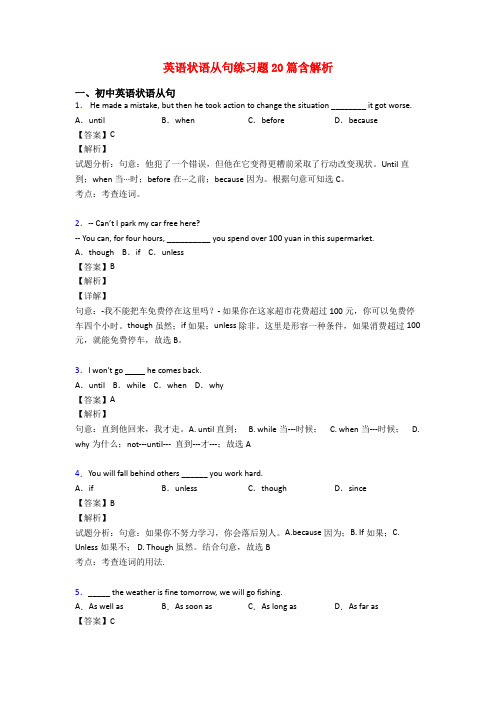
英语状语从句练习题20篇含解析一、初中英语状语从句1. He made a mistake, but then he took action to change the situation ________ it got worse. A.until B.when C.before D.because【答案】C【解析】试题分析:句意:他犯了一个错误,但他在它变得更糟前采取了行动改变现状。
Until直到;when当···时;before在···之前;because因为。
根据句意可知选C。
考点:考查连词。
2.-- Can’t I park my car free here?-- You can, for four hours, __________ you spend over 100 yuan in this supermarket. A.though B.if C.unless【答案】B【解析】【详解】句意:-我不能把车免费停在这里吗?- 如果你在这家超市花费超过100元,你可以免费停车四个小时。
though 虽然;if 如果;unless 除非。
这里是形容一种条件,如果消费超过100元,就能免费停车,故选B。
3.I won't go he comes back.A.until B.while C.when D.why【答案】A【解析】句意:直到他回来,我才走。
A. until 直到; B. while当---时候; C. when当---时候; D. why为什么;not---until--- 直到---才---;故选A4.You will fall behind others ______ you work hard.A.if B.unless C.though D.since【答案】B【解析】试题分析:句意:如果你不努力学习,你会落后别人。
(完整版)状语从句练习题及答案详解
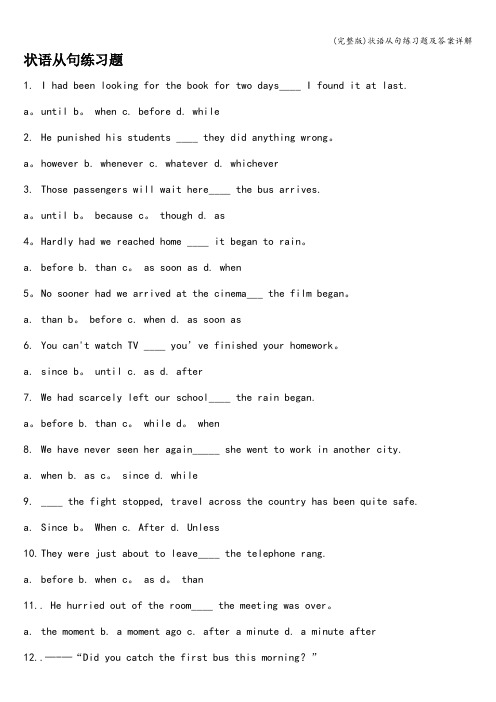
状语从句练习题1. I had been looking for the book for two days____ I found it at last. a。
until b。
when c. before d. while2. He punished his students ____ they did anything wrong。
a。
however b. whenever c. whatever d. whichever3. Those passengers will wait here____ the bus arrives.a。
until b。
because c。
though d. as4。
Hardly had we reached home ____ it began to rain。
a. beforeb. than c。
as soon as d. when5。
No sooner had we arrived at the cinema___ the film began。
a. than b。
before c. when d. as soon as6. Y ou can't watch TV ____ you’ve finished your homework。
a. since b。
until c. as d. after7. We had scarcely left our school____ the rain began.a。
before b. than c。
while d。
when8. We have never seen her again_____ she went to work in another city.a. whenb. as c。
since d. while9. ____ the fight stopped, travel across the country has been quite safe.a. Since b。
(英语)状语从句练习题含答案及解析

(英语)状语从句练习题含答案及解析一、初中英语状语从句1.--Has the meeting begun yet?--Not yet. We have to wait everyone is here.A.and B.until C.or D.but【答案】B【解析】【详解】考查连词用法。
句意:—会议已经开始了吗?—不,还没有。
我们必须等到大家都到齐了。
and和;until直到;or或者、否则,but但是。
根据题干可知我们得等到大家都到了,这里表示直到……时候用until.故选B.2.-Have you improved your spoken English?-Not yet.I'll try my best______I am not good at it now.A.so B.although C.but D.until【答案】B【解析】【详解】句意:——你提高你的英语口语了吗?——还没有.虽然我现在还不擅长,但是我会尽力的.考查连词辨析。
A. so所以;B. although 虽然;C. but但是;D. until直到。
根据语境推测句意是——你提高你的英语口语了吗?——还没有.虽然我现在还不擅长,但是我会尽力的.在这里两个句子之间存在一个相反的让步关系,though/although/even though“虽然;尽管”,引导让步状语从句,故选B.【点睛】本题主要考查连词的用法,连词在句子中主要起联系上下文的作用,他们之间的区别就是表示逻辑关系的不同,所以在解题时先要理解上下文含义,然后根据上下文逻辑关系选择合适的连词.前后句之间是让步关系.3.You will fall behind others ______ you work hard.A.if B.unless C.though D.since【答案】B【解析】试题分析:句意:如果你不努力学习,你会落后别人。
A.because因为;B. If如果;C. Unless如果不; D. Though虽然。
(英语)状语从句练习题含答案及解析

(英语)状语从句练习题含答案及解析一、初中英语状语从句1.--Has the meeting begun yet?--Not yet. We have to wait everyone is here.A.and B.until C.or D.but【答案】B【解析】【详解】考查连词用法。
句意:—会议已经开始了吗?—不,还没有。
我们必须等到大家都到齐了。
and和;until直到;or或者、否则,but但是。
根据题干可知我们得等到大家都到了,这里表示直到……时候用until.故选B.2.-Have you improved your spoken English?-Not yet.I'll try my best______I am not good at it now.A.so B.although C.but D.until【答案】B【解析】【详解】句意:——你提高你的英语口语了吗?——还没有.虽然我现在还不擅长,但是我会尽力的.考查连词辨析。
A. so所以;B. although 虽然;C. but但是;D. until直到。
根据语境推测句意是——你提高你的英语口语了吗?——还没有.虽然我现在还不擅长,但是我会尽力的.在这里两个句子之间存在一个相反的让步关系,though/although/even though“虽然;尽管”,引导让步状语从句,故选B.【点睛】本题主要考查连词的用法,连词在句子中主要起联系上下文的作用,他们之间的区别就是表示逻辑关系的不同,所以在解题时先要理解上下文含义,然后根据上下文逻辑关系选择合适的连词.前后句之间是让步关系.3.You will fall behind others ______ you work hard.A.if B.unless C.though D.since【答案】B【解析】试题分析:句意:如果你不努力学习,你会落后别人。
A.because因为;B. If如果;C. Unless如果不; D. Though虽然。
【英语】英语状语从句练习题含答案含解析
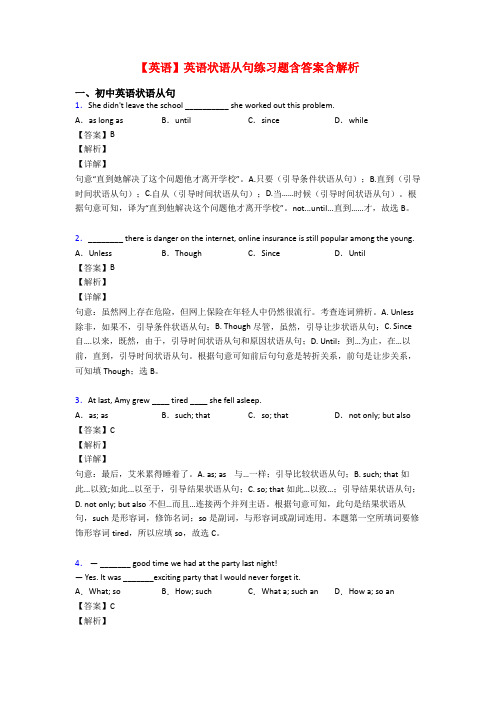
【英语】英语状语从句练习题含答案含解析一、初中英语状语从句1.She didn't leave the school __________ she worked out this problem.A.as long as B.until C.since D.while【答案】B【解析】【详解】句意“直到她解决了这个问题他才离开学校”。
A.只要(引导条件状语从句);B.直到(引导时间状语从句);C.自从(引导时间状语从句);D.当……时候(引导时间状语从句)。
根据句意可知,译为“直到他解决这个问题他才离开学校”。
not...until...直到……才,故选B。
2.________ there is danger on the internet, online insurance is still popular among the young. A.Unless B.Though C.Since D.Until【答案】B【解析】【详解】句意:虽然网上存在危险,但网上保险在年轻人中仍然很流行。
考查连词辨析。
A. Unless 除非,如果不,引导条件状语从句;B. Though尽管,虽然,引导让步状语从句;C. Since 自….以来,既然,由于,引导时间状语从句和原因状语从句;D. Until:到…为止,在…以前,直到,引导时间状语从句。
根据句意可知前后句句意是转折关系,前句是让步关系,可知填Though;选B。
3.At last, Amy grew ____ tired ____ she fell asleep.A.as; as B.such; that C.so; that D.not only; but also 【答案】C【解析】【详解】句意:最后,艾米累得睡着了。
A. as; as 与…一样;引导比较状语从句;B. such; that如此...以致;如此...以至于,引导结果状语从句;C. so; that如此…以致…;引导结果状语从句;D. not only; but also不但…而且…连接两个并列主语。
状语从句[含练习和答案解析]
![状语从句[含练习和答案解析]](https://img.taocdn.com/s3/m/d4e53bc17c1cfad6195fa740.png)
第十二讲状语从句(含练习与答案)担任状语的从句叫状语从句,可以用来表示时间、地点、原因、目的、结果、条件、方式、比较、让步等。
一、时间状语从句:引导词有after,before,as,once,since,till,until,when,whenever,while,as soon as,the moment/minute…(一…就),the time, the day, every time, next time, each time,by the time ,no sooner…than(一…就),hardly(scarcely)…when(一…就)immediately/directly等.Each/Every time he comes here, he will drop in on me.He was ill last time I saw him.上次我见到他时他病了.Hardly had I got to the office when my wife phoned me to go back home at once.=No sooner had I got to the office than my wife phoned me to go home at once.I recognized him immediately I saw him.※ when, while与 as当主句动作时瞬时的,从句动作是延续的,三者都可以用。
when引导的从句动词可以是延续性的或短暂性的,在“be…when…”句式中when表“at that time(就在这时)”意。
while引导的从句中动词必须是延续性的;有时并不表示时间,而表示对比,意“而”、“却”,并列连词,表对照。
As 强调主、从句动作同时或几乎同时发生,意为“一边…一边…”。
When I got home I found the door locked.While / When / as we were working in the fields, it suddenly began to rain.He was wandering through the streets when a bike hit him.I was about to go out when the telephone rang.I had just arrived at school when my wife phoned me to go home.His pencil is red, while mine is yellow.John sang happily as he went along.※ till与until一般情况下可以互换,但until可以位于句首,till则不能。
中考英语状语从句练习(有答案讲解)

状语从句练习【有答案讲解】1.—Keep working hard, Linda. You will surely achieve your dream _______ you don’t give it up halfway.— I will, thank you, Miss Li.A .sinceB .ifC .thoughD .until【来源】辽宁阜新【答案】B【解析】句意:——琳达,一直努力吧。
如果你不中途放弃,你将一定会实现梦想。
——我会的,谢谢你,李小姐。
since自从,与现在完成时连用;if如果,引导的条件状语从句,用一般现在时,主句用一般将来时;though尽管;until直到。
结合句意,如果不中途放弃,就一定会实现梦想,故用连词if,故选B 。
2.—Jack, remember ______ off the lights when _______your bedroom.—OK, I won’t forget, Mom.A .turning; leavingB .to turn; leaveC .turning; leftD .to turn; leaving【来源】四川达州【答案】D【解析】句意:——杰克,记得离开卧室时把灯关掉。
——好吧,妈妈,我不会忘记的。
考查非谓语动词。
上一句句意:杰克,离开卧室时记得关灯。
remember to do sth.记得去做某事(未做);remember doing sth.记得做过某事(已做)。
when doing sth.是省略了主谓语的时间状语从句。
故选D 。
3.—When is the school art festival?—It will be held on time if it______ next Monday.A .don’t rainB .won’t rainC .doesn’t rainD .didn’t rain【来源】四川南充【答案】C【解析】句意:学校的艺术节是什么时候?——如果不下雨的话,下周一将会如期举行。
英语状语从句练习题及答案

英语状语从句练习题及答案一、初中英语状语从句-Shall we go for a picnic in the forest park tomorrow? -Yes,it rains heavily.A. if1B. unlessC. untilD. When【答案】B【解析】试题分析:句意:一明天我们在森林公园进行野餐怎么样?一是的,如果雨下的不大。
A. if'如果;B. unless除非;C.Until直到;D. When当……的时候。
结合句意可知是unless引导的条件状语从句,故选B考点:考查连词的用法。
1.I have to leave now _ I can catch the last bus.A. so thatB. because ofC. untilD. as soon as【答案】A【解析】试题分析:so that以便,所以;because of因为,由于;until直到;as soon as -……就……。
句意:为了赶上末班车,我现在必须离开了。
结合语境可知选A。
考点:连词辨析点评:连词在句子中主要起联系上下文的作用,他们之间的区别就是表示逻辑关系的不同,所以在解题时先要理解上下文含义,然后根据上下文逻辑关系选择合适的连词。
连词的用法都比较多,语义之间还有交叉,熟记其基本应用规则,了解其区别,注意固定搭配对象,是做好此类题型的关键。
2.Rony will get a chance to work in this company he doesn't pass the interview.A. unlessB. whenC. ifD. after【答案】A【解析】【详解】句意〃除非罗尼没有通过面试,否则他将有机会在这个公司上班〃。
A.除非;B.当……时候;C. 如果;D.在……时候。
根据句意可知,表示〃除非他没有通过面试〃,故选A。
3.there is danger on the internet, online insurance is still popular among the young.A. UnlessB. ThoughC. SinceD. Until【答案】B【解析】【详解】句意:虽然网上存在危险,但网上保险在年轻人中仍然很流行。
英语状语从句答题技巧及练习题(含答案)及解析
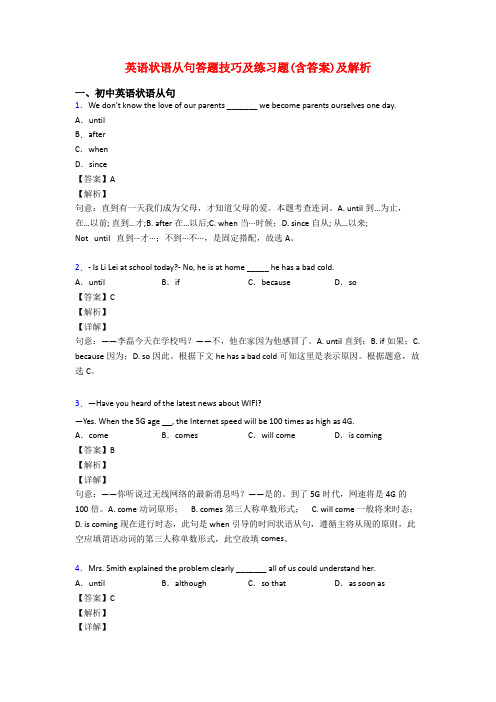
【解析】
【详解】
句意:——我不知道萨姆明天是否会来。——别担心,他一来我就告诉你。
结合语境可知,本句主语描述的是将来某时进行的动作,故用一般将来时态。当主句描述将来时态,if引导的条件状语从句中用一般现在时态表示将来动作,结合语境可知选B。
9.Now most families have only one child _____ our country’s one-child policy.
—Yes. When the 5G age, the Internet speed will be 100 times as high as 4G.
A.comeB.comesC.will comeD.is coming
【答案】B
【解析】
【详解】
句意:——你听说过无线网络的最新消息吗?——是的。到了5G时代,网速将是4G的100倍。A. come动词原形;B. comes第三人称单数形式;C. will come一般将来时态;D. is coming现在进行时态,此句是when引导的时间状语从句,遵循主将从现的原则,此空应填谓语动词的第三人称单数形式,此空故填comes。
5.--- What was the party like?
--- Wonderful. It’s years ____ I enjoyed myself so much.
A.sinceB.afterC.whenD.before
【答案】A
【解析】
试题分析:句意:聚会怎么样?太精彩了,好多年了我没玩的这么高兴过。此题是考查句型:It’ s years + since +一般过去式,此题中的动词是enjoyed延续性动词,应从动作结束算起,可以翻译成它的反义词,故选A。
状语从句及练习附答案

状语从句(adverbial clause)复习要点:掌握句法功能,记住连接词语法意义:状语从句是复合句中的一种,整个从句作主句的状语,修饰主句中的谓语动词、形容词、或副词。
置于句首时,状语从句后面一般要有逗号隔开;如果状语从句置于句尾,则从句一般不用逗号。
按照所作的状语和意义可分为时间、地点、原因、目的、结果、条件、让步、方式和比较等九种状语从句。
具体如下:一、时间状语从句(Adverbial Clauses of Time)时间状语从句通常由when,whenever,as,while,before,after,assoon as,since,once,no sooner...then,hardly/scarcely...when,tiLl/until 以及the moment,directly,immediately,the second,thefirst time,next time,every time,等引导。
1.由when,as,while 引导的状语从句:1)when 引导时间状语从句,表示当···,其谓语动词可以是延续性的,也可以是非延续性的,其作用最广泛。
When spring comes,trees turn green,When it rains,I usually go to work by taxi.When we were having lunch,the light went out.I will ring you up when I return.When she pressed the button,the lift stopped.He was eating his breakfast when the doorbell rang.be about to do...when...“就在那/这时,(突然)另一个动作发生了,在这儿只能用when。
英语状语从句练习题20篇及解析

英语状语从句练习题20篇及解析一、初中英语状语从句1.I didn’t believe I could do it ____ I got to the top of Mount Tai.A.unless B.until C.after D.as【答案】B【解析】试题分析:句意:直到我到达泰山顶上我才相信我能成功。
A. unless如果不,除非,引导条件状语从句;B. until 直到,引导时间状语从句;C. after 在……后,引导时间状语从句;D. as因为,由于,引导原因状语从句。
not …until直到……才,结合句意,故选B。
考点:考查连词的用法。
2.You'd better get home earlier today we can go out for a big meal.A.in order to B.such that C.so that D.in order【答案】C【解析】句意:你最好今天早点回家,这样我们就可以出去吃大餐了。
A. in order to 为了,后跟动词原形;B. such that没有此用法;C. so that为了,引导目的状语从句;D. in order+that+从句,引导目的状语从句。
we can go out for a big meal表示目的的完整句子,所以使用连词词组so that。
故选:C。
3.— _______ good time we had at the party last night!— Yes. It was _______exciting party that I would never forget it.A.What; so B.How; such C.What a; such an D.How a; so an【答案】C【解析】【详解】试题分析:句意:昨天晚上我们在聚会上玩的是多么开心呀!是的,它是如此的令人兴奋以至于我永远不会忘记它。
状语从句练习题及答案
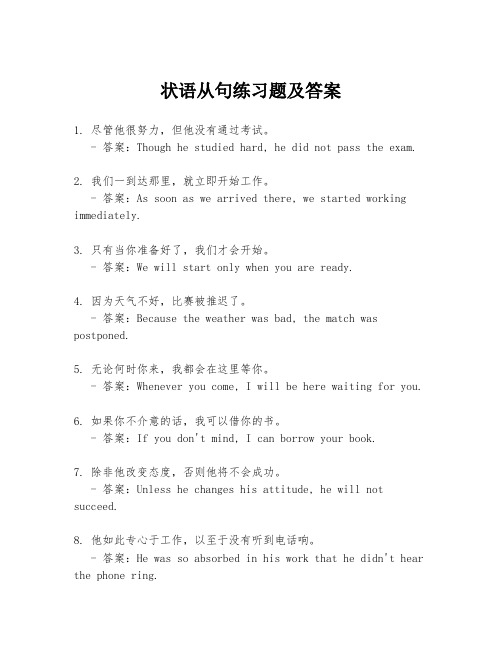
状语从句练习题及答案1. 尽管他很努力,但他没有通过考试。
- 答案:Though he studied hard, he did not pass the exam.2. 我们一到达那里,就立即开始工作。
- 答案:As soon as we arrived there, we started working immediately.3. 只有当你准备好了,我们才会开始。
- 答案:We will start only when you are ready.4. 因为天气不好,比赛被推迟了。
- 答案:Because the weather was bad, the match was postponed.5. 无论何时你来,我都会在这里等你。
- 答案:Whenever you come, I will be here waiting for you.6. 如果你不介意的话,我可以借你的书。
- 答案:If you don't mind, I can borrow your book.7. 除非他改变态度,否则他将不会成功。
- 答案:Unless he changes his attitude, he will not succeed.8. 他如此专心于工作,以至于没有听到电话响。
- 答案:He was so absorbed in his work that he didn't hear the phone ring.9. 她一完成作业,就出去和朋友见面了。
- 答案:She went out to meet her friends as soon as she finished her homework.10. 只要我们团结一致,我们就能克服任何困难。
- 答案:As long as we stand united, we can overcome any difficulty.答案解析- 状语从句通常位于主句之前或之后,有时也可以用逗号与主句隔开。
状语从句练习(含答案和解析)
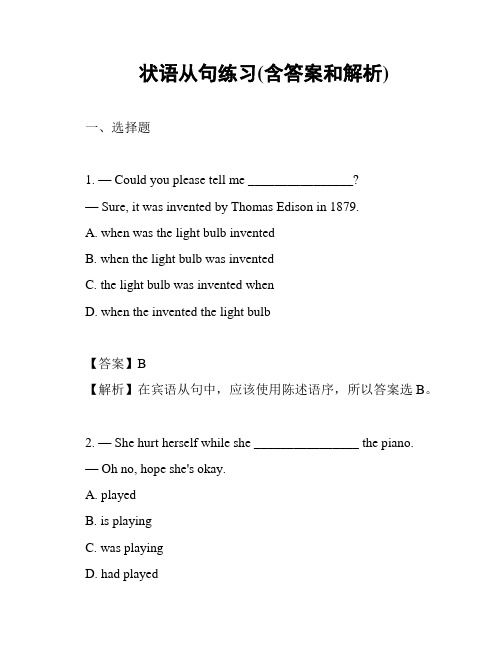
状语从句练习(含答案和解析)一、选择题1. — Could you please tell me ________________?— Sure, it was invented by Thomas Edison in 1879.A. when was the light bulb inventedB. when the light bulb was inventedC. the light bulb was invented whenD. when the invented the light bulb【答案】B【解析】在宾语从句中,应该使用陈述语序,所以答案选B。
2. — She hurt herself while she ________________ the piano. — Oh no, hope she's okay.A. playedB. is playingC. was playingD. had played【答案】C【解析】句子发生的时间是过去,所以应该使用过去进行时,答案选C。
3. The book is not on the table, ________________ I last saw it.A. soB. becauseC. butD. although【答案】A【解析】根据句意,表达的是因果关系,所以应该使用连词so,答案选A。
4. I'll join you for dinner ________________ it doesn't rain.A. whetherB. ifC. soD. because【答案】B【解析】根据句意,表示条件,所以应该使用if,答案选B。
5. — ________________ you study hard, you won't pass the exam.— I know, I'll try my best.A. IfB. UnlessC. WhetherD. Although【答案】B【解析】根据句意,表示否定条件,所以应该使用unless,答案选B。
(英语)英语状语从句练习题含答案及解析
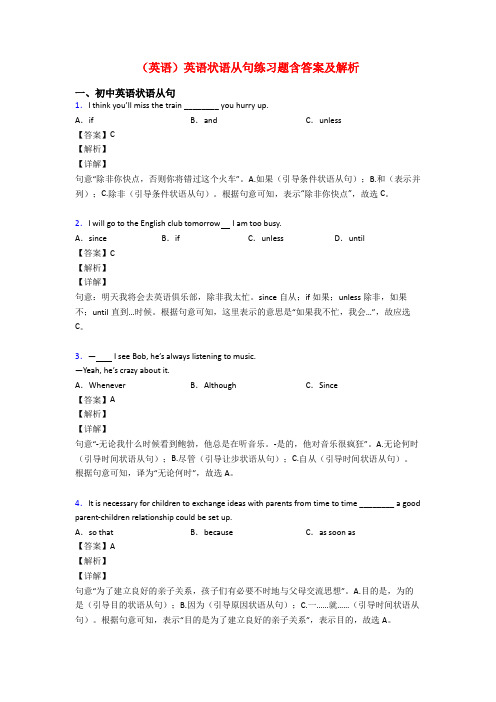
---- Yes. But if it ________, we will visit the museum instead.
A.you have; will rainB.you will have; will rain
A.hadB.will have
C.are havingD.were having
【答案】C
【解析】
【详解】
句意:今天的年轻人没有智能手机就活不下去。无论何时甚至在吃饭时他们都手里拿着手机。考查动词时态。while表示一段时间,后面使用进行时态,主句是一般现在时,可知从句使用现在进行时;故答案C。
13.___________ she couldn’t see his face, she could tell by his voice that he was young.
A.UnlessB.IfC.BecauseD.Though
【答案】D
【解析】
【详解】
句意:虽然她看不见他的脸,但是她能够通过声音分辨出他很年轻。A. Unless除非;B. If如果;C. Because因为;D. Though尽管。根据语境以及上下文,本题考查的是连词的用法。结合句意可知,在这里两个句子之间存在一个相反的让步关系,though/although/even though"虽然;尽管",引导让步状语从句,符合句意。故答案选D。
C.you will have; rainsD.will you have; rains
【答案】C
【解析】
试题分析:句意:--汤姆想知道明天你是否去野炊。--是的,但是如果下雨的话,我们将改去参观博物馆。if意为“是否”时,引导宾语从句,句中有tomorrow,用一般将来时态,第二空中if引导条件状语从句意为“假如”,主句用将来时从句用一般现在时表示将来,故选C。
状语从句练习(附答案)
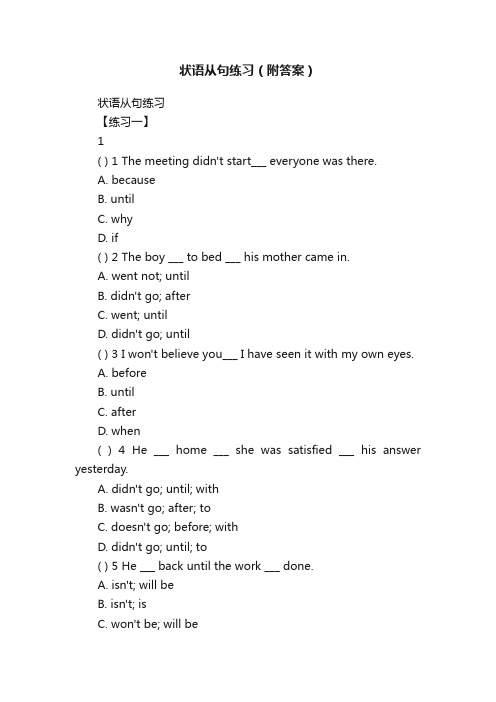
状语从句练习(附答案)状语从句练习【练习一】1( ) 1 The meeting didn't start___ everyone was there.A. becauseB. untilC. whyD. if( ) 2 The boy ___ to bed ___ his mother came in.A. went not; untilB. didn't go; afterC. went; untilD. didn't go; until( ) 3 I won't believe you___ I have seen it with my own eyes.A. beforeB. untilC. afterD. when( ) 4 He ___ home ___ she was satisfied ___ his answer yesterday.A. didn't go; until; withB. wasn't go; after; toC. doesn't go; before; withD. didn't go; until; to( ) 5 He ___ back until the work ___ done.A. isn't; will beB. isn't; isC. won't be; will beD. won't be; is( ) 6 They didn't start the work ___ their teacher came back.A. untilB. whileC. as soon asD. if2( ) 1 Tom will call me as soon as he ___ Shanghai.A. arrivesB. will reachC. arrives inD. get to( ) 2 I'm sure he'll come to see me before he ___ Beijing.A. will leaveB. is leavingC. leaveD. leaves( ) 3 I will tell him the news as soon as he___ back.A. comeB. comesC. will comeD. came3( ) 1 T om has got a watch. He ___ it for two years. It _______ by his father.A. has bought; was boughtB. has got; is bought ,C. was bought; has bought .D. has had; was bought "'( ) 2 When he got to the station, the train ___.A. leftB. had leftC. leavesD. has left( ) 3 The boy told his father what he ___ in the street.A. sawB. have seenC. had seenD. see( ) 4 We ___ TV when the telephone ____.A. watched; was ringingB. were watching; rangC. watch; ringsD. are watching; rang( ) 5 By the end of last term, I___ ten books.A. had finished readingB. have finish readingC. had finish to readD. finish read4( ) 1 I ___ you for a long time. Where ___ you ___?A. didn't see; did; goB. didn't see; have; goneC. haven't seen; have; beenD. haven't seen; have; gone( ) 2 Tom___ China for 3 years.A. has beenB. has been inC. has been toD. has been at( ) 3 I won't go to see the film tonight, because I ___ my ticket.A. lostB. have lostC. will loseD. didn't lose( ) 4 -Hello! May I speak to Bob?A. had been awayB. was leftC. leftD. has been away( ) 5 I ___ him since I began to live in the city.A. knowB. have knownC. knewD. will know( ) 6 Zhao Lan ___ already ___ in this school for two years.A. was; studyingB. will; studyC. has; studiedD. are; studying5( ) 1 Betty didn't go to see the film yesterday ___ she was ill.A. becauseB. butC. untilD. if( ) 2 May I sit nearer___I can see more clearly?A. as ifB. so thatC. even ifD. so( ) 3 ___ you work hard, you will certainly succeed.A. ThoughB. IfC. BecauseD. For( ) 4 ___ he came to study in the university, he has made much progress in the study of English.A. WhileB. WhenC. SinceD. After( ) 5 I'd like to go swimming _____ the water is not too cold.A. forB. unlessC. ifD. whether6( ) 1 There are ___ many league members in class 2 ___ in Class4.A. both; andB. 'so; thatC. either; orD. as; as( ) 2 -Do you have a big library?-No, we don't. At least, not___yours.A. as big asB. as big thanC. as bigger thanD. bigger as( ) 3 Suzhou is not ____ beautiful ____ Hangzhou.A. as; thanB. so; asC. even; thanD. /; than( ) 4 Iron is more useful ___ any other metal.A. asB. thanC. thenD. so7( ) 1 I want to know ___ she is going to see a film.A. ifB. thatC. whatD. which( ) 2 You are sure to pass the exam ___ you study hard.A. ifB. thoughC. thatD. since( ) 3 I'll go to see the film with you___I have time this evening.A. whetherB. soC. ifD. when( ) 4 ___ you study harder, you'll never pass the final exam.A. IfB. UntilC. UnlessD. Except8( ) 1 Although it was raining, ----still worked in the fields.A. but theyB. and theyC. theyD. and yet they( ) 2 ___ there were only five soldiers left at the front, ___ they went on fighting.A. Because; soB. If; andC. Though; butD. Though; /( ) 3 ___ she is very old, ___ she can still work eight hours a day.A. Because; soB. Though; butC. As; yetD. Though; yet9( ) 1 Please answer the question in a loud enough voice ___ all the class may hear.A. so, thatB. orC. in order thatD. and( ) 2 Lift it up___I may see it.( ) 3 I hurried___I wouldn't be late for class.A. soB. so thatC. ifD. unless( ) 4 We should go by bus ___ we can get there earlier.A. as soon asB. whereC. in order thatD. as10( ) 1 The dictionary is so expensive ___ I can't buy it.A. becauseB. whenC. thatD. if( ) 2 I got there ___ late ___ I didn't see him.A. too; toB. such; thatC. so; thatD. so; as( ) 3 It is ___ hot in the room ___ we have to go out for a walk.A. such; thatB. so; thatC. as; asD. such; as( ) 4 He has___ an interesting book that we want to read it.A. soB. suchC. the sameD. as参考答案:1. 1-6 B D B A D A2. 1-3 C D B3. 1-5 D B C B A4. 1-6 C B B D B C5. 1-5 A B B C C6. 1-4 D A B B7. 1-4 A A C C8. 1-3 C D D9. 1-4 C B B C10. 1-4 C C B B【练习二】1. 时间状语从句2. 条件状语从句3. 原因状语从句4. 结果状语从句5. 比较状语从句6. 目的状语从句7. 让步状语从句8. 地点状语从句【名师点睛】:用来修饰主句中的动词,副词和形容词的从句叫状语从句。
- 1、下载文档前请自行甄别文档内容的完整性,平台不提供额外的编辑、内容补充、找答案等附加服务。
- 2、"仅部分预览"的文档,不可在线预览部分如存在完整性等问题,可反馈申请退款(可完整预览的文档不适用该条件!)。
- 3、如文档侵犯您的权益,请联系客服反馈,我们会尽快为您处理(人工客服工作时间:9:00-18:30)。
第十二讲状语从句(含练习与答案)担任状语的从句叫状语从句,可以用来表示时间、地点、原因、目的、结果、条件、方式、比较、让步等。
一、时间状语从句:引导词有after,before,as,once,since,till,until,when,whenever,while,as soon as,the moment/minute…(一…就),the time, the day, every time, next time, each time,by the time ,no sooner…than(一…就),hardly(scarcely)…when(一…就)immediately/directly等.Each/Every time he comes here, he will drop in on me.He was ill last time I saw him.上次我见到他时他病了.Hardly had I got to the office when my wife phoned me to go back home at once.=No sooner had I got to the office than my wife phoned me to go home at once.I recognized him immediately I saw him.※ when, while与 as当主句动作时瞬时的,从句动作是延续的,三者都可以用。
when引导的从句动词可以是延续性的或短暂性的,在“be…when…”句式中when表“at that time(就在这时)”意。
while引导的从句中动词必须是延续性的;有时并不表示时间,而表示对比,意“而”、“却”,并列连词,表对照。
As 强调主、从句动作同时或几乎同时发生,意为“一边…一边…”。
When I got home I found the door locked.While / When / as we were working in the fields, it suddenly began to rain.He was wandering through the streets when a bike hit him.I was about to go out when the telephone rang.I had just arrived at school when my wife phoned me to go home.His pencil is red, while mine is yellow.John sang happily as he went along.※ till与until一般情况下可以互换,但until可以位于句首,till则不能。
Until it stops raining,the children can’t go out.=Not until the rain stops can the children go out.二、地点状语从句引导词有where,wherever.I’ll go wherever the people want me to go. (wherever=to any place where)He works where his grandfather fought. (where=in the place where)Where there is a will, there is a way. (Where=In the place where)三、原因状语从句引导词有because, since, as, now(that) (既然)回答以why提出的问题时,只能用because。
since=now (that), 表“既然”意,表示已知的或明显的原因。
Now that/Since you are free today, you may have a rest at home or go out for a walk.for 是一个并列连词,用来连接两个并列句,引导的句子是对前面一句话的内容的推测或补充说明。
It must have rained last night, for the ground is wet.The day has broken, for the birds are singing. (这两句中的for不可替换)四、目的状语引导词有so that, in order that, that, in case(免得,以防)。
目的状语从句的谓语常含有can/could/may/might/will/would等情态动词。
He ran as fast as possible in order that he could catch the bus.Please remind me of it again tomorrow in case I forget.五、方式(或比较)状语从句引导词有as, as if, as though, the way, than, as/so…as,the more…the more.It looks as if it is going to rain.My teacher treats us as if she were our mother.Sometimes we teach our children the way our parents have taught us.Tom is not so/as tall as John.He runs faster than I.注:as…as可用于肯定句或否定句,so…as只能用于否定句。
六、结果状语从句引导词有so…that,such…that, so that.(意思是“如此…以致…)He works so hard that he makes great progress in his studies.It’s such a difficult problem that nobody can work it out.(从句不是目的,没有can, may)There’s not any noise here so that I feel very comfortable.※修饰形容词、副词只能用so.He walked so fast that I couldn’t keep up with him.※修饰many, much, few, little (少) 时,习惯用so.There were so many books in the shop that he didn’t know which to buy.※修饰可数名词单数可用so或suchIt is such an interesting book (= so interesting a book) that we all like it very much.※修饰不可数名词或可数名词复数时,用such.The villagers were such kind people that they all came to help us.七、条件状语从句引导词有if, unless, as/so long as, on condition that, in case(万一,如果),从句的时态用一般现在时(含现在完成时),一般过去时(含过去完成时)分别代替一般将来时和过去将来时。
If it rains tomorrow, I won’t go there.He said he would not go back home unless he had achieved a lot.I’ll study so long as I’m alive.In case he come, let me know.They can't leave unless they have done their work.※If 引导的条件句可以是真实性条件句,也可以是非真实性条件句(用于虚拟语气)八、让步状语从句引导词有though, although, even if, even though, as, whoever, whatever,however, no matter+what/w ho/when/…等。
Though/Although he is ill, he still goes to school.She started her experiment, even though she had little money.Whatever you found, you must turn it in.However hard he worked, he hardly made any progress.※ as 作“尽管, 虽然”意时,常用倒装句式。
Try as he would, he couldn’t lift the heavy box.Young as he is, he knows a lot.=Although he is young, he knows a lot.若表语为名词,冠词要省略。
Child as/though he is, he has remembered a lot of English words.(though不可换为although) although或though不能与but同时出现在一个复合句中,但是“Although/Though…,(and)yet…”句式却是正确的。
Although it is raining heavily, yet they are repairing the bridge.九、使用状语从句时要注意的几个问题1、在时间和条件(有时也在方式、让步等)从句中,主句是一般将来时,从句通常用一般现在时表示将来。
We’ll go outing if it doesn’t rain tomorrow.I’ll write to you as soon as I get to Shanghai.2、有些时间、地点、条件、方式或让步从句,如果从句的主语与主句主语一致(或从句主语是it),从句的谓语又包含动词be ,就可省略从句中的“主语+ be”部分。
When (he was) still a boy of ten, he had to work day and night.If (you are) asked you may come in.If (it is) necessary I’ll explain to you again.3、注意区分不同从句:引导的是什么从句,不仅要根据连词,还要根据句子结构和句意来判别。
